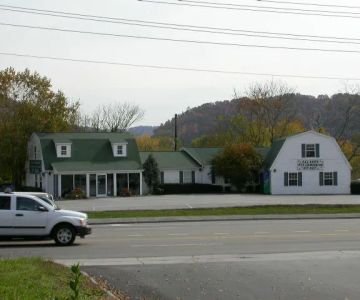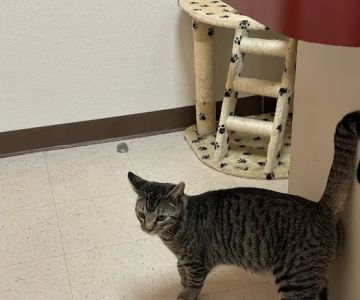0.0
Veterinary Surgical Services provides advanced, specialized surgical care for pets, operating as a dedicated referral center rather than a general 'Pet Hospital.' Discover their highly specialized environment, comprehensive surgical offerings, features like board-certified expertise and advanced diagnostics, and how they partner with your primary veterinarian for optimal outcomes.
-
Overview
- (865) 696-4440
Welcome to Veterinary Surgical Services
Veterinary Surgical Services, while falling under the broad "Pet Hospital" category, distinguishes itself significantly from a typical general practice animal hospital. It operates as a specialized referral center, focusing exclusively on advanced surgical procedures for pets. This means that instead of providing routine check-ups, vaccinations, or general medical care, Veterinary Surgical Services typically receives patients referred by their primary veterinarians when a complex surgical intervention is required. This specialization allows them to offer a higher level of expertise, equipment, and dedicated surgical support for intricate cases.
The environment at a Veterinary Surgical Services facility is highly specialized and designed with advanced surgical care in mind. Unlike a general practice, the focus is on providing a sterile, high-tech, and calm setting conducive to complex operations and post-operative recovery. While the specific layout may vary by location, one would expect to find:
State-of-the-Art Operating Suites: These are equipped with advanced surgical lighting, anesthesia machines, patient monitoring systems (ECG, blood pressure, oxygen saturation, temperature), and specialized instruments for various types of surgery.
Dedicated Recovery Areas: Post-operative care is paramount, so recovery areas are typically quiet, temperature-controlled, and equipped for continuous monitoring, pain management, and attentive nursing care.
Advanced Diagnostic Imaging: Access to high-resolution X-rays, often CT (Computed Tomography) scans, and sometimes MRI (Magnetic Resonance Imaging), is common, as precise imaging is crucial for surgical planning.
Consultation Rooms: While focused on surgery, there are dedicated spaces for detailed discussions with pet owners about surgical options, risks, and recovery plans.
Highly Trained Staff: The entire team, from the surgical technicians to the front office staff, is trained to handle critical and post-surgical patients, often with a focus on minimizing stress for both the animal and its owner.
The atmosphere is professional, meticulously clean, and often quieter than a general practice, reflecting the serious nature of the specialized care provided. Pet owners visiting such a facility are typically already informed about their pet's condition and the need for advanced surgery, and the environment aims to instill confidence and provide comfort during a stressful time.
The services offered by Veterinary Surgical Services are entirely centered around advanced surgical procedures and related care. These typically include, but are not limited to:
Orthopedic Surgery: This is a major component, covering a wide range of bone, joint, ligament, and muscle issues. Common procedures include repair of cranial cruciate ligament (CCL) ruptures (e.g., TPLO, TTA), fracture repair, patellar luxation correction, arthroscopy, and joint replacement.
Soft Tissue Surgery: This encompasses procedures involving internal organs, skin, and non-bony structures. Examples include tumor removal (surgical oncology), abdominal surgeries (e.g., foreign body removal, gastropexy), thoracic surgeries, reconstructive surgery, and perineal surgery.
Neurosurgery: For conditions affecting the brain, spinal cord, and peripheral nerves. Common neurosurgical procedures might include intervertebral disc disease (IVDD) repair, spinal stabilization, and tumor removal.
Minimally Invasive Surgery: Many specialized surgical centers offer laparoscopic (abdominal) and thoracoscopic (chest) procedures, which involve smaller incisions, less pain, and faster recovery times compared to traditional open surgery.
Surgical Oncology: Dedicated surgical treatment of cancerous tumors, often requiring complex resections and reconstructive techniques, often in collaboration with veterinary oncologists.
Post-Operative Care and Rehabilitation Planning: A critical component, this involves intensive monitoring, pain management protocols, and often guidance for physical rehabilitation to ensure optimal recovery and return to function. This care extends beyond the immediate surgery and into the pet's recovery period at home.
Advanced Anesthesia and Pain Management: Highly skilled veterinary anesthesiologists or dedicated anesthesia technicians ensure the safest possible anesthesia for complex procedures, with comprehensive pain management strategies before, during, and after surgery.
Consultations and Second Opinions: Specialists provide in-depth consultations for complex cases, offering detailed surgical assessments and recommendations based on their extensive expertise.
The features that distinguish Veterinary Surgical Services and make it an essential resource for pet owners and general veterinarians are its extreme specialization and high level of expertise:
Board-Certified Veterinary Surgeons: This is perhaps the most significant feature. These facilities are staffed by veterinarians who have completed extensive post-doctoral training (residency) and passed rigorous examinations to become board-certified specialists in veterinary surgery (Diplomates of the American College of Veterinary Surgeons - ACVS). This ensures the highest level of surgical skill and knowledge.
Advanced Equipment and Technology: The investment in cutting-edge surgical equipment, advanced imaging modalities (CT, MRI), and specialized diagnostic tools is a hallmark of these centers, allowing for more precise diagnoses and complex procedures.
Team-Based Approach: Surgical specialists often work collaboratively with the pet's primary veterinarian, internal medicine specialists, oncologists, and other specialists to provide comprehensive, integrated care, ensuring all aspects of the pet's health are considered.
Focus on Patient Safety and Pain Management: A deep commitment to minimizing patient risk during surgery and ensuring effective pain control throughout the surgical journey is paramount, leading to better outcomes and a more humane experience for the pet.
Experience with Complex Cases: Due to their referral nature, these centers handle a high volume of challenging and unusual surgical cases, leading to unparalleled experience in managing complicated conditions.
Minimizing Fear, Anxiety, and Stress (FAS): While not always explicitly "Fear Free certified," specialist centers often adopt principles to reduce FAS, recognizing that patients undergoing surgery are already vulnerable.
Promotional information for Veterinary Surgical Services typically differs from that of a general "Pet Hospital." Instead of broad consumer-facing specials, their "promotions" are more targeted towards educating referring veterinarians and pet owners about the benefits of specialized surgical care. Common promotional strategies include:
Referral Relationship Building: A significant portion of their promotional efforts is directed at primary care veterinarians through direct outreach, educational seminars, and providing easy referral processes. They promote their expertise as an extension of the primary vet's care.
Educational Content for Pet Owners: Their websites and informational materials often feature detailed explanations of various surgical procedures, what to expect before and after surgery, and the benefits of specialist care. This empowers pet owners to make informed decisions when their primary vet recommends a referral.
Success Stories and Testimonials: Showcasing successful surgical outcomes and testimonials from grateful pet owners can build trust and demonstrate their capabilities.
Online Presence and SEO: Maintaining a professional website with clear information about their specialized services, surgeons' credentials, and referral process is crucial. Optimizing for keywords like "pet orthopedic surgery," "veterinary cancer surgery," or "animal neurosurgery" helps pet owners whose primary vets have recommended specialized care find them.
Continuing Education for Veterinarians: Offering continuing education (CE) opportunities for general practitioners helps build relationships and showcases their expertise, encouraging referrals.
Transparency in Pricing and Payment Options: While not "discounts," they often clearly outline their fee structure for consultations and procedures, and may highlight acceptance of financing options like CareCredit, recognizing that specialized surgery can be a significant investment.
In conclusion, Veterinary Surgical Services functions as a highly specialized "Pet Hospital" that focuses exclusively on advanced surgical care for companion animals. Its environment, services, and features are tailored to providing expert surgical interventions, comprehensive post-operative care, and a collaborative approach with primary veterinarians. Their promotional efforts are geared towards establishing trust with referring veterinarians and educating pet owners about the critical role of specialized surgical expertise in achieving the best possible outcomes for complex medical conditions.
Veterinary Surgical Services Details
Accessibility
- Wheelchair-accessible car park
- Wheelchair-accessible entrance
Veterinary Surgical Services Location
Knoxville, TN 37923, USA
Reviews
Pet Hospital
 Anderson County Animal Hospital
Anderson County Animal Hospital
286 S Charles G Seivers Blvd, Clinton, TN 37716, USA
 Anderson County Animal Hospital: Wilson Melissa DVM
Anderson County Animal Hospital: Wilson Melissa DVM
286 S Charles G Seivers Blvd, Clinton, TN 37716, USA
 Anderson County Animal Hospital: Ensley Kristy DVM
Anderson County Animal Hospital: Ensley Kristy DVM
286 S Charles G Seivers Blvd, Clinton, TN 37716, USA
 Clinton Animal Hospital
Clinton Animal Hospital
730 N Charles G Seivers Blvd, Clinton, TN 37716, USA
 Norris Veterinary Animal Hospital
Norris Veterinary Animal Hospital
2683 Andersonville Hwy # 15, Clinton, TN 37716, USA
 ACAH Norris
ACAH Norris
Directly Across from the Museum of Appalachia!, 2822 Andersonville Hwy #61, Clinton, TN 37716, USA
